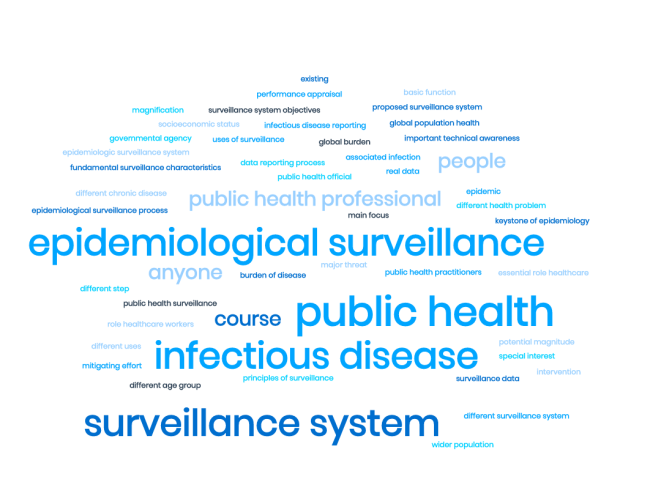
Key information
For more information and to register interest, please visit our dedicated website.
Infectious diseases represent a major threat to global population health. Moreover, they disproportionately affect people from different age groups and socioeconomic statuses, and manifest differently among people with different chronic diseases leading to the magnification of the global burden of disease.
Public health officials are always challenged by epidemics and outbreaks, whether acute, chronic, infectious, or non-infectious. In order for them to contribute to the health and well-being of the wider population, they must understand the potential magnitude of the different health problems, as well as how some mitigating efforts help tackle public health emergencies. Public health practitioners must be trained in epidemiological surveillance to contribute to their communities’ safety and to guarantee that their responses and interventions are based on facts and real data.
Course Overview
Epidemiology is considered to be the foundation of public health where epidemiological surveillance is the keystone of epidemiology. This training will equip the participants with the important technical awareness and skillset that will enable them to work with different surveillance systems. Throughout the course, the main focus will be on the surveillance system objectives, the data reporting process, fundamental surveillance characteristics, and performance appraisals. It is a course that has been specifically designed for public health professionals and anyone with special interest in learning about the fundamentals of epidemiological and public health surveillance of infectious diseases. It is also dedicated to anyone who develops surveillance systems, aims to do so, or use the data generated by surveillance.
Teaching methods will involve a combination of theoretical lectures as well as some interactive practical sessions. Practical applications will make use of data that has some relevance to contemporary issues in the epidemiological surveillance of infectious diseases. Throughout this course, participants will complete a project exercise. To mimic the real problems faced by epidemiologists and public health professionals, the aim of this project is to help participants to engage in different activities such as reflection, application, mapping, analysis, and assessment.
Course Aims
The aim of this course is to equip the participants with the knowledge and tools to:
- Understand the importance of epidemiological surveillance and mapping systems of infectious diseases and their impact on the population health.
- Describe basics of epidemiological surveillance and the features of different surveillance systems, their applications, and their strengths and weaknesses.
- Describe the key policies and initiatives used in the control of important outbreaks and epidemics of infectious diseases, and all matters related to their application and assessment.
- Apply epidemiological methods to the investigation of outbreaks.
- Comprehend and grasp the issues involved in managing and evaluating subsequent interventions to infectious disease outbreaks such as vaccination programs, involving endorsing and calculating vaccine coverage, monitoring efficacy and side effects, arranging vaccination timetables and conducting serological surveillance
- Understand the challenges that must be overcome to achieve progress in mitigating the global burden of infectious diseases and meeting the Sustainable Development Goals (SDGs) agreed by the international committee.
Target Audience
The target audience of this course are people with managerial and supervisory roles who are responsible of developing, implementing and evaluating public health programs, supervising staff, creating public health policy recommendations, and forming and retaining community engagement. Individuals with these responsibilities are required to have some understanding of the significance of epidemiological surveillance of infectious diseases and potential outbreaks and epidemics. This training will provide them with the essential knowledge and skillset to enable them to make better informed decisions as leaders in their area of expertise.
This training fits the learning needs of medical and clinical trainees, public health consultants, and professionals working in infectious disease control and those pursuing a better understanding of the epidemiological surveillance of infectious diseases.
Course Learning Outcomes
Upon successful completion of the course, participants will be able to:
- Define what epidemiological surveillance of infectious diseases mean.
- Understand and describe the legalities of infectious disease reporting.
- Identify the basic functions of epidemiological surveillance of infectious diseases.
- Discuss the essential roles healthcare workers, public health professionals, and governmental agencies in the epidemiological surveillance process.
- Discuss the different uses of surveillance data.
- List the different steps needed in forming a successful epidemiologic surveillance system.
- Assess and evaluate an existing or a proposed surveillance system.
- Apply the principles of surveillance to healthcare associated infection.
Course Structure
The course will be divided into the following modules:
- Surveillance as a cornerstone in public health practice.
- Definition of surveillance objectives.
- Epidemiologic surveillance data reporting system.
- Epidemiological surveillance system attributes and performance assessment.
Faculty
Public Health England
Imperial College London School of Public Health
Imperial WHO Collaborating Centre for Public Health Education and Training
Others
For more information and to register interest, please visit our dedicated website.